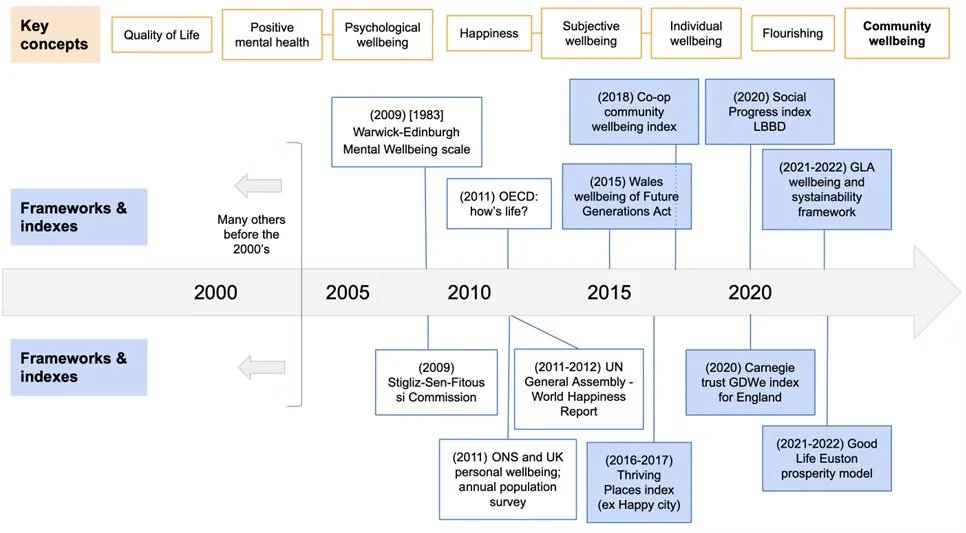Using administrative data to understand community wellbeing
About the project
Knowledge about place-based wellbeing is currently derived from a combination of self-reported data from surveys and qualitative studies, economic, and space/service provision data. Local governments hold substantial behavioural data on their servers – council tax records, closed-circuit television feeds, noise complaints, library membership, etc – but this information is not currently used to analyse and develop new policies focused on wellbeing. This information is more objective than self-reported data, and it also carries a variety of ethical concerns.
This project explores whether government agencies can use behavioural data – administrative and other data that records the activities and acts of community members – to gain additional insight into place-based community wellbeing.
The project is led by Professor Lasana Harris, Senior Lecturer at the UCL Department of Experimental Psychology, and is funded by the Nuffield Foundation and part of the Understanding Communities Fund.
Dr Saffron Woodcraft, Executive Lead at PROCOL UK at the Institute for Global Prosperity, co-leads on the first stage of the research.
Rafael Carrascosa Marzo
“The timing couldn’t be more relevant. Local authorities are under severe financial pressure, and the demand for better, faster, and more cost-effective ways of measuring well-being has never been greater.
At the same time, national conversations about data infrastructure and AI in government are gathering pace. With inequalities widening and economic growth no longer translating straightforwardly into improved living standards, finding new ways to understand and support community well-being is no longer a “nice to have”, it’s essential. ”
Work Packages
WP1
Review of landscape
WP2
Ethical approach to using behavioural data
WP4
Impact assessment of demonstrators
WP3
Behavioural data demonstrators with local authority partners
WP5
Behavioural Data for Community Insight Network
What is community wellbeing?
The first stage of the project consisted of conducting a review of the current landscape community wellbeing measurement through a behavioural lens. We identified different definitions of community wellbeing, indices and frameworks that are currently used in the UK.
We also identified common conceptual domains, (e.g. community connections and belonging; healthy environments; employment and opportunities) that can be measured using the type of behavioural data sources that are routinely collected by local authorities and governmental agencies.
We also aimed to find out where there is no need to collect behavioural data as it already exists, as well as identify new data sources and ways of measurement that complement existing frameworks and contribute to creating new knowledge about community wellbeing.
Findings
According to the findings, a widely accepted definition of ‘community well-being’ does not exist yet.
But we could use the following as a good starting point:
Community wellbeing is the combination of social, economic, environmental, cultural and political conditions identified by individuals and their communities as essential for them to flourish and fulfil their potential'.
– Wiseman and Brasher, 2008
We found that wellbeing indicators can be objective or subjective, and focus on individuals or on the community. But this understanding can also be somewhat flexible, and it is useful to think in terms of a spectrum from subjective to objective; and from individual to community, as shown in the diagram right:
As per our review, the wellbeing and the UK community wellbeing measurement landscape can be very succinctly summarised in a timeline:
Barriers to using administrative data and AI
The project developed a proof-of-concept Community Well-being Index Dashboard based on the ‘Good Life Euston Model’ as a starting point for understanding community well-being. By running administrative data through an AI model, the researchers were able to generate well-being scores for every local authority in England.
While the study brings to light the huge potential that administrative data and AI could bring to understanding the needs and challenges of communities, it also highlights the barriers:
Local authorities do not currently have the capacity or infrastructure to enable the widespread use of administrative data to measure community wellbeing.
Along with data infrastructure reform, we recommend legal and policy reform around data and data governance including debate on public and community data ownership and use.
Experts should work alongside community members to outline potential for misuse of data, and discussions around data privacy infrastructure and institutional trust.
Community well-being is complex and context specific. Further research is needed to investigate the multiple dimensions of community well-being and to better understand the dynamics between community well-being and other socio-economic variables.





